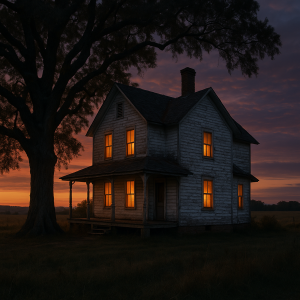The letter arrived on a rainy Tuesday, its edges worn but the handwriting unmistakably my Aunt Margaret’s. “Come to Willow Creek,” it read. “The old farmhouse is yours now. I’m moving to a care home, and I want you to have it.” I stared at the words, my coffee growing cold. Margaret, my late mother’s sister, had been distant since Mom’s death a decade ago. Why me? Why now? My husband, Daniel, was skeptical but supportive. “Maybe it’s her way of making amends,” he said. I wasn’t so sure.
Willow Creek was a three-hour drive, a sleepy town where the farmhouse stood like a relic of forgotten summers. Its white paint peeled, and the porch sagged, but the sprawling fields and ancient oak tree stirred memories of childhood visits with Mom and Margaret. Margaret greeted us with a frail smile, her eyes sharp despite her age. “It’s yours,” she said, pressing the keys into my hand. “But there’s something you need to do first.” Her tone held an edge, like she was testing me.

She led us to the attic, where a locked trunk sat under a dusty tarp. “Open it when you’re ready,” she said, then left without another word. Daniel and I exchanged glances. The farmhouse was a dream—a place to escape our cramped city apartment—but Margaret’s cryptic task felt like a trap. That night, I couldn’t sleep, the trunk’s presence looming in my mind.
The next morning, I pried open the trunk, revealing a jumble of letters, photos, and a leather-bound journal. The letters were from Mom, written to Margaret in her final years. My heart ached as I read her words, full of love but also regret. One letter mentioned a “family debt” Margaret had refused to forgive. The journal, though, was the real shock. It was Margaret’s, detailing a bitter falling-out with Mom over a land deal. Mom had sold part of the family’s estate to save Margaret from bankruptcy, but Margaret saw it as betrayal, accusing Mom of stealing her legacy. The final entry read: “I’ll keep the truth buried until the right one comes along.”
I was reeling. Mom had always said Margaret was stubborn but never hinted at this rift. Then I found a yellowed document—a deed naming me as co-owner of the farmhouse, signed by Mom before her death. Margaret had known and kept it secret, gifting me the house as if it were her own generosity. Anger surged. She’d manipulated the narrative, painting Mom as the villain while hiding my rightful claim.
Daniel urged me to confront her, but I needed answers first. I drove to the county records office, where a clerk confirmed the deed was valid. The farmhouse had been Mom’s to give, not Margaret’s. But there was more: Margaret had recently tried to sell the property to a developer, only to be blocked by the deed’s restrictions. She’d offered me the house to gain my trust, hoping I’d sign over my share.

I returned to Willow Creek, the journal and deed in hand. Margaret was in the garden, pruning roses with unsteady hands. “You knew,” I said, holding up the documents. “This was Mom’s house, and you tried to sell it.” Her face hardened, but she didn’t deny it. “Your mother took everything from me,” she spat. “The land, the family name. I deserved that sale.”
Her words cut, but I saw her for what she was: a woman trapped by resentment, unable to let go. “Mom saved you,” I said. “And you punished her by erasing her from this place.” I told her I’d keep the farmhouse, not to spite her but to honor Mom. Margaret’s eyes welled, but she turned away, silent.
The next day, I found a note slipped under the door. It was from Margaret, apologizing for her bitterness and admitting Mom’s sacrifice. “Keep the house,” she wrote. “It’s where you belong.” I didn’t forgive her—not yet—but I felt a weight lift. Daniel and I began restoring the farmhouse, stripping away years of neglect. As we painted the walls, I hung a photo of Mom under the oak tree, her smile bright against the fading light.
But the story didn’t end there. A month later, a lawyer contacted me about a trust fund Mom had set up, hidden in the same deed. It wasn’t millions, but it was enough to renovate the farmhouse and start a small community center in Willow Creek, a place for families to gather and heal. My cousins, who’d sided with Margaret, called, fishing for a share, but I shut them down. This was Mom’s legacy, not theirs.

Standing on the porch one evening, watching kids play in the fields, I realized the farmhouse wasn’t just a gift—it was a truth Mom had entrusted to me. Margaret’s silence had nearly buried it, but I’d broken through. The house was home now, not because of its walls but because of the love it held.
Moral: Truth may be buried by resentment, but courage and love can unearth it, building a legacy stronger than secrets.





